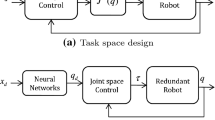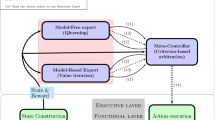Abstract
Lately, development in robotics for utilizing in both industry and home is in much progress. In this research, a group of robots is made to handle relatively complicated tasks. Cooperative action among robots is one of the research areas in robotics that is progressing remarkably well. Reinforcement learning is known as a common approach in robotics for deploying acquisition of action under dynamic environment. However, until recently, reinforcement learning is only applied to one agent problem. In multi-agent environment where plural robots exist, it was difficult to differentiate between learning of achievement of task and learning of performing cooperative action. This paper introduces a method of implementing reinforcement learning to induce cooperation among a group of robots where its task is to transport luggage of various weights to a destination. The general Q-learning method is used as a learning algorithm. Also, the switching of learning mode is proposed for reduction of learning time and learning area. Finally, grid world simulation is carried out to evaluate the proposed methods.













Similar content being viewed by others
References
Russell S, Zimdars AL (2003) Q-decompsition for reinforcement learning agents. In: Proceeding of the twentieth international conference on machine learning (ICML-2003), Washington
Kose H, Tatlidede U, Mericli C, Kaplan K, Levent Akin H (2004) Q-learning based market-driven multi-agent collaboration in robot soccer. Department of Computer Engineering, Bogazici University
Dzeroski S (2003) Relational reinforcement learning for agents in worlds with objects. Institut Jozef Stefan
Albus JS (1996) The engineering of mind. In: Proceedings of the fourth international conference on simulation of adaptive behavior (from animals to animats 4), MIT Press, pp 23–32
Leslie Pack Kaeling (1993) Hierarchical learning in stochastic domains: preliminary results. In: Proceedings of the tenth international conference on machine learning
Stone Peter, Veloso Mamuela (1998) A layered approach to learning client behaviors in the robocup soccer server. Appl Artif Intell 12:2–3
Author information
Authors and Affiliations
Corresponding author
About this article
Cite this article
Kim, SG., Taguchi, S., Hong, SI. et al. Cooperative behavior control of robot group using stress antibody allotment reward. Artif Life Robotics 19, 16–21 (2014). https://doi.org/10.1007/s10015-013-0135-8
Received:
Accepted:
Published:
Issue Date:
DOI: https://doi.org/10.1007/s10015-013-0135-8




